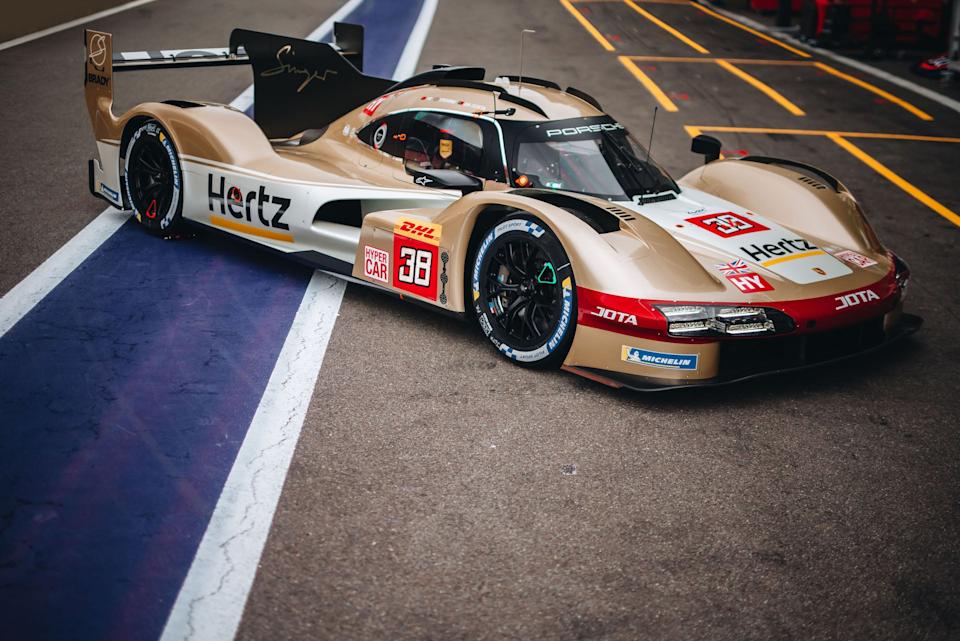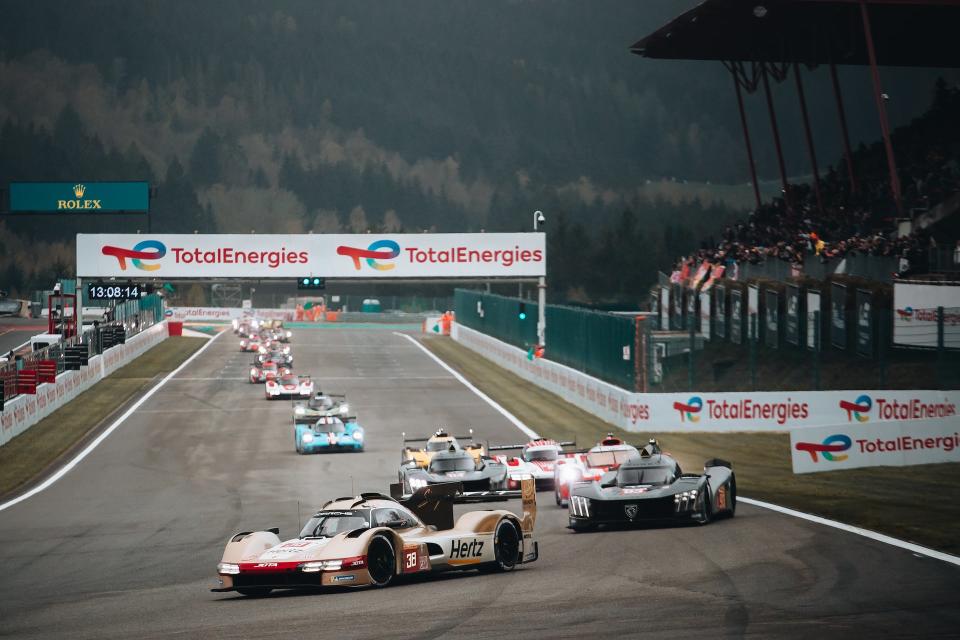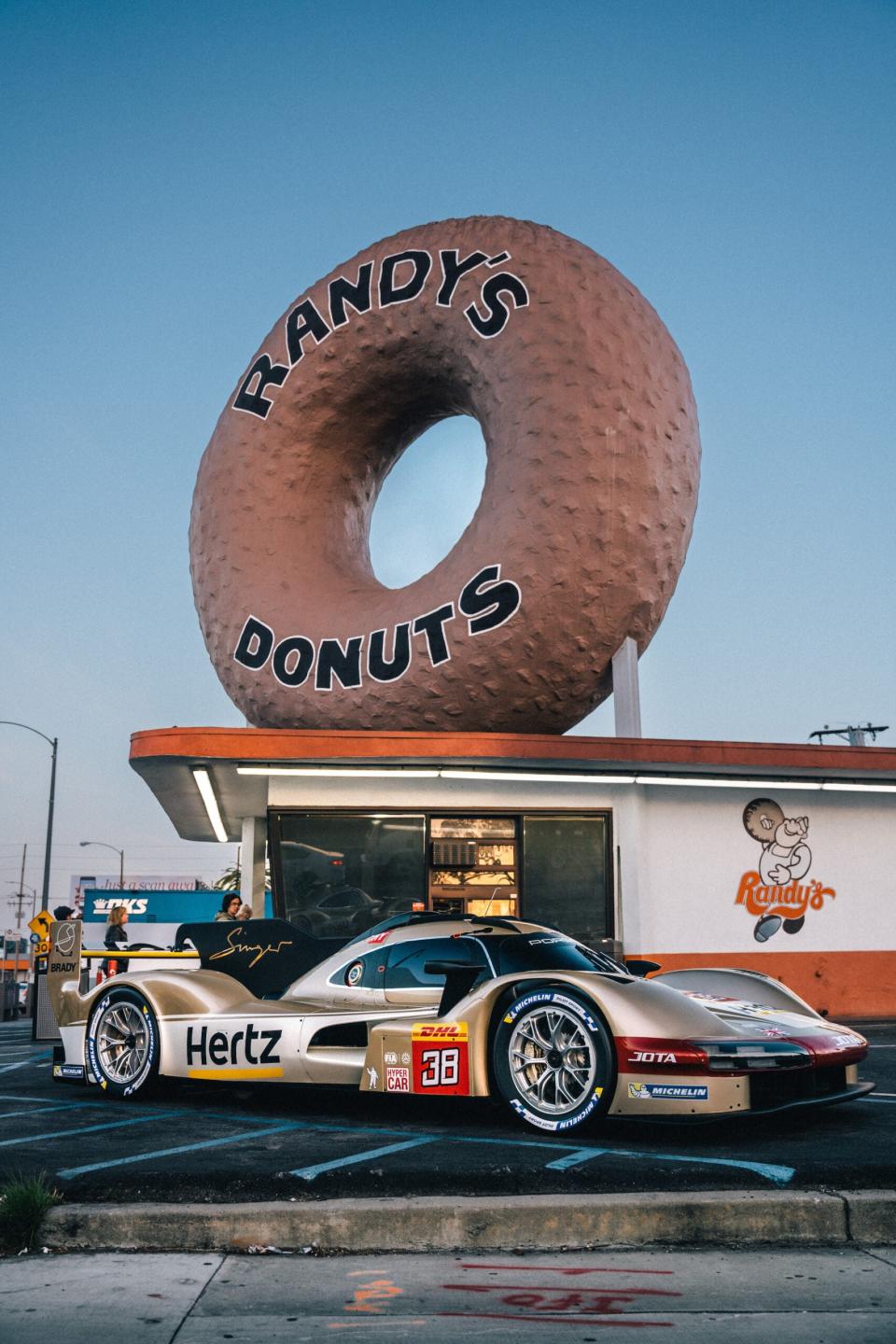Why Hertz Is Getting Back Into Racing

Last weekend, Hertz Team Jota debuted its Porsche 963 Hypercar at the World Endurance Championship's 6 Hours of Spa. The No. 38 qualified seventh on the grid and went on to finish sixth on race day, putting it right in the mix with heavyweight factory teams from Ferrari, Peugeot, Toyota, and even Porsche. Surviving 148 laps on a track that's famously torturous on hardware was enough reason for celebration, but as a privateer team with minimal testing under its belt and a fraction of the resources of a factory team, the squad walked away elated. For Hertz CEO Stephen Scherr, this kind of David-versus-Goliath attitude was the reason why the rental car company signed up to be the team's title sponsor to begin with.
"We want to make a bold statement that Hertz is back in racing," Scherr told me ahead of the race. "We're a brand that's been around for 104 years, and we've had a long history in auto racing. Our sponsorship of Team Jota is now bringing us back in a very edgy way with an iconic car that pops in that Hertz racing gold. Auto racing embeds all of the elements of what we want to be as a brand."

Hertz has previously been involved in other racing series in the U.S. and abroad, having sponsored everything from NASCAR stock cars to WRC rally cars and MotoGP bikes. Last summer, however, the car rental giant announced its return to global auto racing with their sponsorship of Team Jota in the WEC.
Jota is a British privateer team that isn't a stranger to success, having won at the highest levels of the FIA's WEC series, including an LMP2 victory at Le Mans in 2022. A privateer team differs from a factory team in that it's a separate entity from the engine and chassis manufacturers. They're often called "customer teams" because they literally buy equipment from these suppliers and then set out to race on their own—and often against those very same manufacturers’ factory teams. Such is the case with Jota, who must race its Porsche 963 Hypercar against Stuttgart's own Penske Porsche outfit.
For Jota co-owner Sam Hignett, it's this monumental challenge that pushes him and his team to achieve more with, in many ways, less.





"It's an honor to be able to compete against the might of Penske, and it's just a privilege that we're able to be able to come into this [Hypercar] class and race against people like Penske and Ganassi," Hignett told me. "We're very humble and proud of what we've achieved. Penske [and Porsche] have been very gracious in helping us get started [with some software help due to the late delivery of Jota's 963] but Penske is our competitor, and we are their competitor."
Auto racing is a ruthless sport, and like all global competition, it's also a ruthless business. In a nutshell, it operates like this: a sports team has its own fans and it reaches those fans (along with the opposing team's fans) every time it goes on the field. If a match is broadcasted on TV then it reaches even more fans and makes that team more appealing to brands. The bigger and better the team, the more it can charge sponsors—and, in theory, the better the sponsor's return on investment. If you want the extended version of this, you can read my deep dive into the business of racing.
As a company with more advertising dollars than most big companies' entire operating budgets, Hertz gets this concept, and it certainly did its homework before choosing WEC and Jota. I specifically asked Scherr if it had considered Formula 1—especially given its recent boom in America—and he explained that Hertz had a wide range of options to make its return to racing. There was something about WEC that made it extra appealing, he said, having as much to do with the series' categories and technology as much as it did its global reach.

"We considered all of them, but honestly, we felt that the WEC gave us an opportunity to be more experimental, to put a hybrid car out there, and that was exciting to us," Scherr told me. "Hertz is dominant in the United States and we'd love to [leverage that to] bring the influence of auto racing into the U.S. [from Europe] as it's a very, very popular sport here. We also felt that expanding our exposure into Europe in a series of races in Portugal and Belgium and France and Italy and then moving on to Bahrain and Japan.
"It was the global impression that we were looking for, and WEC gave us an opportunity to be experimental. We have multiple objectives that we're really trying to achieve," he added.
One of those objectives is the series' focus on drivetrain technology and how it relates to everyday cars—or everyday rental cars, in this case. WEC's Hypercar class—essentially the counterpart to IMSA's GTP class that debuted at this year's Rolex 24 at Daytona—features spec hybrid systems that make cars more powerful, but also considerably more efficient over the course of a race.
According to Scherr, 10% of Hertz's fleet is currently made up of electric vehicles. However, that number is expected to grow to 25% by 2024, when the company will offer not just more EVs, but a wider variety of them ranging from small hatchbacks to midsize sedans and larger crossovers. It's this kind of tie-in that Hertz was after when choosing WEC/Jota.

Scherr is confident that Hertz's strategy will pay off big time because of the dramatic increase in post-pandemic travel. Specifically, people's desire to experience things outside of their homes instead of buying material goods. In retrospect, its sponsorship of Jota not only represents the company's return to racing but also leaving behind the disastrous effects of the 2020 coronavirus pandemic, when strict travel restrictions worldwide, the near annihilation of the hospitality industry, and the crumbling of the automotive supply chain put Hertz in a tough position.
"Just look at the sheer number of people that are queuing up to come to this race [in Spa]. By the way, not an easy race course to get to, yet people are making their way to it because it's a sport and an experience that they're looking to take on, and we want to be a part of that. My view is there's no time to waste. As our customers are returning back to Hertz and returning back to travel, we want to be a part of the experience that's being created by an auto race."
We concluded our chat as preparations for the 6 Hours of Spa were ramping up, which, by the way, was confirmed to have a record-breaking attendance of over 72,000 fans on grandstands (though it wouldn't surprise me if there were another 30,000 fans on the surrounding hills. Scherr was more than ready to head up to the grid where, where after nearly a year-long wait, he'd finally see the Hertz-liveried Porsche 963 Hypercar on the starting grid of its maiden race. He and the rest of the Florida-based Hertz execs who had made the trip to Belgium were genuinely excited. It was evident that this wasn't just another sponsorship contract deal for them. This was something they were passionate about.

I asked Scherr about what in Hertz's racing future made him most excited—what really drove him to convince the board to drop a bunch of money into auto racing, especially post-pandemic.
"Look, it is in some sense a small part of a big advertising budget, but I think it's important that it puts us back on the map," said Scherr. "It puts our brand on a car. It puts our brand on a car that catches people's attention. They see the poster. They see the photo. They see it on social media.”
Scherr pointed to a screen nearby showing a creative marketing campaign showing a mock Porsche 963 parked in iconic venues throughout the U.S., including some humorous photos of it parked with other rental cars at airport lots.
"I think that everybody wants to be affiliated with something that's cutting-edge at a moment in time when the world is looking for different experiences, and being a part of Hertz Team Jota is a great, great reentry for us into auto racing,” Scherr added. “The attraction, the extent to which it brings customers in, and seeing our name, our brand, on an advanced race car like this is just exciting.

"People like to be customers of companies that are winners. Auto racing embeds all of the elements of what we want to be as a brand. It's edgy, it's fast, it's innovative.”
I made one last inquiry regarding Hertz's possible future expansion into other series such as F1 or IndyCar. Scherr shared the following:
"The future of Hertz in auto racing is a bright one and a big one," said Scherr.
The CEO and some of his executive team will make the trek to Le Mans in June to see the No. 38 Porsche 963 Hypercar sport its gold Hertz livery at the biggest endurance race in the world. At that point, it'll be up to Hignett and the rest of Team Jota to deliver on their end and hopefully claim back-to-back Le Mans wins.
Email the author at jerry@thedrive.com

 Yahoo Autos
Yahoo Autos 